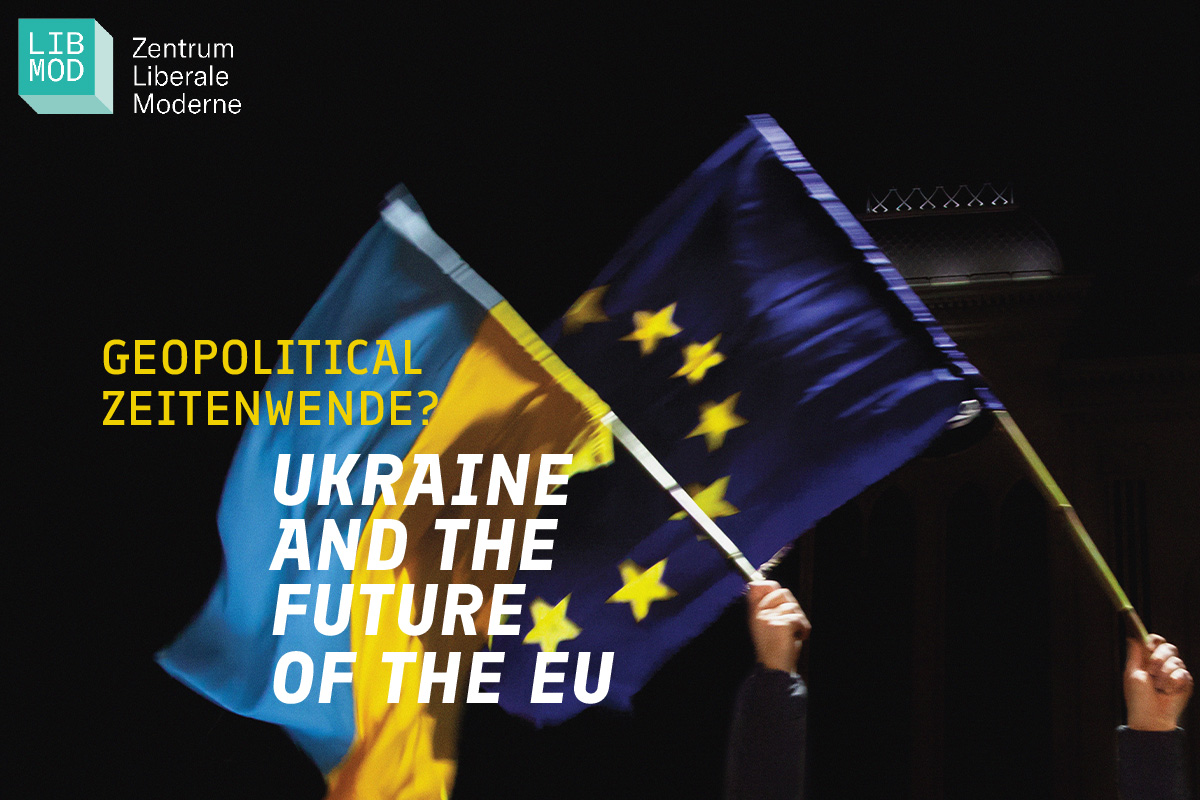Security in Times of Change

An introduction to our report and a summary of our results.
Why “Security in Times of Change”?
We are living in a time of fundamental changes, which are unfolding rapidly and simultaneously. These are transforming our societies radically and pose new challenges for policy makers. Past experience can only play a small part in solving them. They include
- globalisation
- the digital revolution
- global migration
- demographic change
- radical changes in gender and family relations
- climate change as a symptom of ecological crisis.
Each of these phenomena alone constitutes a great challenge in itself. They are mutually reinforcing, as is the case for climate change and migration or digital revolution and globalisation. Taken on intelligently, these challenges offer opportunities for a better future while at the same time harbouring the potential for significant social and political turbulence.
Constant change is a characteristic of the modern age. Working and living environments are in a perpetual state of flux, traditional allegiances and certainties are dissolving, the new is ousting the old. This dynamic has increased further with the end of the bipolar world and the onset of a new phase of globalisation. The last 30 years have been a period of accelerated discontinuity. This holds true for economics, technology and culture as much as for the individual. An increasing desire for security, consistency and belonging echoes this process. There is evidently a need for a certain “security corridor” to be able to risk change. Only those who feel reasonably secure will regard globalisation or the digital revolution as an opportunity rather than a threat.
Security is not an end in itself for the commission. A fundamental level of security is a prerequisite for anyone to fulfil their potential. “Freedom from fear” is the mother of all freedoms. Therefore the question for the commission was: what kind of reassurances does our pluralist society need to face technical, social and cultural change with self-confidence instead of fear?
Shaping the Change
Germany in 2019 is one of the most successful national economies. It is the most open society this country has ever known and is experiencing the longest period of peacetime in its history as a member of the European Union. Nevertheless, there is a noticeable and increasing sense of insecurity, extending to the middle classes. Although a large majority is satisfied with their personal life, many look ahead to the future with pessimism. Confidence in the state’s and the political system’s planning capacities has begun to falter. Many feel powerless in the face of rapid changes. These are perceived as events going over the heads of individuals, events which can no longer be managed by policy makers
Growing insecurity and a loss of trust in the liberal order prepare the ground for the global advancement of authoritarian and nationalist currents. Support for identitarian movements of national or religious provenance is rising. They promise security by retreating into the national circle of wagons, by shielding from international competition and the influx of strangers.
The key question is what answers liberal democracy can find to the challenges of change and the resulting insecurity. We cannot shield ourselves from the great changes of our time but rather have to take them on as a restructuring task.
The guiding principle for democratic politics should not be security by isolation but rather security in times of change. This involves much more than simply adjusting to perceived factual constraints. We have to shape transformation processes proactively and strengthen trust in democratic politics’ ability to govern.
This includes an expansion of early warning systems for crises (monitoring) and critical evaluation of government programmes and agencies. Especially in the face of complex changes in economy and society, the requirement is for a “learning state” that continually assesses its activities in order to refine or adjust them.
The objective must be an increased social and democratic resilience in our society – that is, more resilience in the face of shock-like changes as well as improvements to the capacity to find creative solutions to new challenges. The course that is set today will to a large part determine which future we end up with. This holds equally true for the digital revolution as for demographic change or the climate change crisis.
Shaping the change means managing change politically and enabling people to keep pace with the changing world. This also includes an element of protection. “A Europe that protects” is a central catchphrase of Emmanuel Macron. Nobody shall be unprotected at the mercy of radical change in economy and society; everybody has the right to solidarity and participation.
At the same time, it is paramount to counteract our societies’ division into winners and losers of technological, cultural and ecological change. It undermines liberal democracy’s promise of the same freedom for everyone. The confluence of growing insecurity and increasing inequality creates an explosive conflict situation.
Key Themes
The commission covered the overall topic “security in times of change” along four key issues:
(1) Empowerment of the individual for self-assured action: It is important to empower people to deal with technological, social and cultural changes confidently. This is about “internal security” in the literal sense – a security arising from the inside. How do we orient our education system to strengthen everyone’s self-efficacy? Which knowledge and skills do we need in order to find our way in a rapidly changing world, to shape the digital revolution and to act in cooperation with others?
Clearly, education and further education are essential for success in a globally-linked, knowledge-based society. The education system is not yet well prepared for the new digital world and our society’s increasing socio-cultural heterogeneity.
The commission submits a variety of proposals for this. Among them empirically-based, sustained educational planning, more emphasis on early years’ education, the establishment of minimum targets for students’ educational success, improved monitoring as well as improved funding for pre-schools and schools based on social indicators. The right to “education for all” should include a higher education degree or a professional qualification.
The further education sector continues to be the poor relation of education policy. This urgently needs to change. “Lifelong learning” is becoming the new norm in the face of fundamental change in employment. The right to education has to be extended to a right to further education and must be underpinned financially. The collective wage agreements negotiated between the Metal Workers’ Union IG Metall Baden-Württemberg and Südwestmetall leads the way in this, proposing a combination of gainful employment and further education. The commission’s advice in this context is to substantiate the concept of an “educational basic income” and to test its feasibility. Vocational colleges should be extended to become technical further education centres, and the transition between vocational training and third-level courses eased.
(2) The future of social security: Are our current social security systems fit for the future or do we need extended social citizens’ rights and new concepts for social participation against the backdrop of the digital revolution and the anticipated changes in the employment system? The answer to this question depends in a large part on our image of the future effects of the digital revolution and demographic change. Both constitute profound change. They harbour the potential to upset previous arrangements of work and social security. We are unable to foresee the future, a statement that is both true and banal. We can, however, attempt to anticipate future developments and to draft more-or-less plausible scenarios.
The commission assumes that the new level of digitisation (AI, robotics) will not lead to an “end of working society” in the foreseeable future. It will probably work more as a “changer of jobs” than as a “destroyer of jobs”. There will be significant upheaval in the world of work even in this scenario, however. Entire professional categories and sectors will shrink, others will emerge. There will be widespread change in the scope of work and the required qualifications. During previous phases of technical rationalisation, the primary concerns were about the fear of job losses in industrial production. Now, even professional services that were considered safe up to this point and that provided relatively high incomes are affected by digitisation.
A trend towards a decreased amount of work in automatised production and in digitisable services such as banks or insurance companies will be counterbalanced by an increased demand in research and development, controlling, further education, health services and the care sector. The analogous world of things continually requires professional skilled tradespeople. The demand for basic services is also likely to increase further.
As long as employment levels decrease only by degrees, the substitution of human work with machines and the decline in human resources due to demographic change may be kept in balance. The growing number of older people in the general population and longer times spent in education require a significant increase in labour productivity to maintain societal prosperity. Well-crafted digitisation processes can work hand-in-hand with demographic change here.
At the same time, new information technologies open up opportunities for more energy and resource efficiency, intelligent mobility, improvements in working conditions, decentralised production, and supra-regional cooperation as well as access to global markets for small and medium-size companies. The serious social challenge of the coming decades will most likely be the increasing polarisation into winners and losers of global competition and technical innovation. Parallels to this can already be observed today in people succeeding or falling behind within the employment system. This finds its most obvious expression in the growing gap between high and low wages and the emergence of a class of “working poor”. The inequality of incomes and assets is also showing a tendency to increase in a digital economy.
The commission considers it unlikely that substantial decoupling of social security and gainful employment will become necessary (and possible). There will, however, be a need for new instruments of social participation that close justice gaps and compensate for deficits in the social security system. Among them is a new initiative for the participation of wide sections of the population in capital assets, in order to ensure a wider spread of the digital dividend as well as everyone’s participation in social wealth (“ownership for all”). This would supplement trade-union wage policies, which are aiming for fair participation of the workforce in the national income. Strengthening collective wage agreements is an integral part of “security in times of change”.Another major problem that needs to be addressed is the pro-active management of economic structural change, as this will be faster and more comprehensive than to date. This will require expanding in-company and cross-company further training and development opportunities, including financial provision for recurring learning phases throughout working life (> chapter 1.2.2 Educational basic income & financial provision for lifelong learning). The German Federal Employment Agency should be developed into an Employment and Further Education Agency, becoming more focused on the preventative qualification of employees and supporting transformation processes.
Measures should be taken to secure the primacy of man over machines in the course of a possible long-term change to a society where machines are better at most value-creating activities. In such a scenario provisions must be made to compensate for a decline in gainful employment with other sources of income (a basic income financed through taxes, capital assets, self-employment).
(3) “Internal security” in the traditional sense, especially upholding the law and protection from violence. In the face of virulent political and religious extremism, cross-border organised crime as well as the heated discussion about serious offences committed by asylum seekers, the topic of internal security gains new relevance. When defending liberal democracy, the public’s need for security must be taken into account. The meaning of the concept of a “well-fortified democracy” must be rethought: how far do we want to go down the mined path of preventative security policy. The fundamental legitimacy of the state is the protection of its citizens’ lives and their freedom. This obligation must be met on both sides.
The commission paid close attention to security in the public space and non-violent political confrontation. Both are elementary achievements of a civil society that must be defended. If the public space is perceived to be hazardous, freedom of movement is limited significantly (especially for women). However right it is to promote tolerance for the plain otherness of people, it is equally necessary to systematically penalise serious rule violations. An increased presence of law enforcement agencies in social hotspots can improve the citizens’ feeling of security as much as planning measures and a housing policy that counteracts social segregation. Violence must not be tolerated. This is also true for the use of violence as a means of political confrontation. It is toxic to democracy. If it spreads, it destroys civil political culture.
The series of murders committed by the group “National Socialist Underground” (NSU) has massively shaken confidence in public security forces, especially among ethnic minorities. Recent news about extreme-right networks within the police force and the army has increased this feeling of insecurity. The constitutional state is struck at its core when those made responsible for its protection take part in anti-constitutional activities. Actions must be taken against this, using the legitimate measures of a constitutional state. At the same time, the security forces need the backing of both policy makers and the public when fulfilling their constitutional obligations.
Political education should be developed further and geared more towards preventing extremism. Teaching staff must be better prepared for this. In critical situations, teams of experts must be available to support schools, youth centres or penal institutions locally.
(4) Finally, the commission was concerned with the question of the role of public institutions and an active civil society in times of fundamental change.The public education system (from kindergarten to college), a wide network of museums, theatres and concert halls, public service broadcasting, libraries, public utilities and transport services are not merely an expression of “public provision”. They are at the same time institutions of the republic, symbolic representations of a democratic commonwealth that facilitate participation and impart belonging. An investment in socio-cultural infrastructure is therefore also an investment in democracy.
In addition, public institutions serve as an anchor of stability in times of turbulent change. They further social cohesion and are central elements of public provision. In recent decades, national, regional and local public investment has been on the decrease (with the exception of the East German Federal States after the fall of the wall), leading to an asset erosion in public infrastructure. We are far behind with the provision of nationwide high-speed data transmission. At the same time, the social expenditure share of public finances has increased. In the light of this, a “primacy for public investment” should be the guideline for national, regional and local budget policy.
Maintaining public infrastructure in regions of demographic as well as economic contraction poses a particular challenge. How can we ensure access to basic services (security, education, health, mobility, public administration) in economically underdeveloped areas? The state’s withdrawal from rural areas does not only create social problems but also provides fertile ground for populist movements, which fuel conflict between prosperous large cities and the regions left behind.“Security in times of change” does not only take place by way of government guarantees. It is also depends substantially on the “social capital” of our society, an extensive network of non-profit organisations, charitable trusts, and welfare organisations as well as a high level of active citizen participation in social and cultural issues. Even democracy depends heavily on an active civil society. Policy makers and public administrations should support citizens’ participation and work with civil society stakeholders to the best of their ability.
The commission supports an extension of current instruments to promote voluntary work (such as the voluntary social year). In this context, the “citizen work” model should also be actively considered. It would allow professionals to take leave for a limited period in order to take an active part in charitable projects. They would receive a tax-financed basic income during this time. Partial professionalisation of volunteer commitment could also be an answer to a possible decline in paid work in the course of the digital revolution.
Local municipalities are the focal point for civic involvement as this is where interaction between citizens and the state is at its closest and where citizens will be able to exert the biggest influence. Local self-government should be strengthened and given better financial support. It offers greater room for manoeuvre locally and thus forms an important contribution in strengthening democracy.
It was neither mission nor intent of the commission to draft radical visions of a completely different society. An unvarnished depiction of negative developments and contributory factors in crises should neither result in resigned fatalism nor in fantasies of leaping into a completely different society. Rather, the commission was guided by the maxim of improving the conditions, basing this on empirical findings and self-critically evaluating their effects. We need more bravery for experimental politics, trying out new concepts in pilot projects before implementing them on a large scale.
When conditions change radically, institutions, political concepts and instruments also have to change. Both policy makers and civil society’s own initiative are critical for this.
Please download or read the full report (in German) here:
Sicherheit im Wandel_Der Bericht
![]()
Hat Ihnen unser Beitrag gefallen? Dann spenden Sie doch einfach und bequem über unser Spendentool. Sie unterstützen damit die publizistische Arbeit von LibMod.
Wir sind als gemeinnützig anerkannt, entsprechend sind Spenden steuerlich absetzbar. Für eine Spendenbescheinigung (nötig bei einem Betrag über 200 EUR), senden Sie Ihre Adressdaten bitte an finanzen@libmod.de
Verwandte Themen
Newsletter bestellen
Mit dem LibMod-Newsletter erhalten Sie regelmäßig Neuigkeiten zu unseren Themen in Ihr Postfach.





